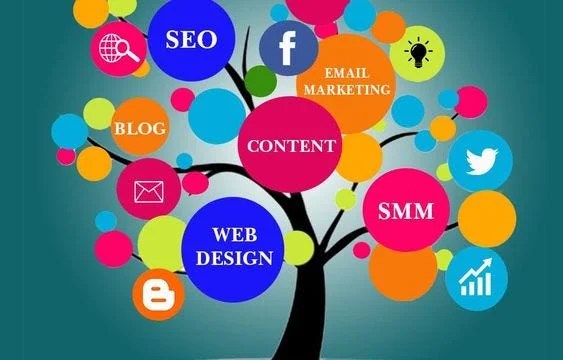[ad_1]
Marketing is an expansive and dynamic field encompassing a diverse range of strategies and techniques to effectively convey products, services, or ideas to a designated audience. In this comprehensive overview, we delve into various forms of marketing, shedding light on their distinct features and applications. From Digital Marketing to Relationship Marketing, each type serves as a powerful tool in the hands of businesses and organizations striving to achieve their objectives.
Digital Marketing:
At the forefront of contemporary marketing, Digital Marketing employs electronic devices and the internet to promote products and services. This comprehensive approach encompasses a multitude of channels such as Social Media Marketing, Email Marketing, Content Marketing, Search Engine Optimization (SEO), Pay-Per-Click (PPC) Advertising, and more. It leverages the vast digital landscape to reach and engage with target audiences effectively.
Content Marketing:
Content Marketing revolves around crafting and disseminating valuable, pertinent, and consistent content aimed at attracting and engaging a specific target demographic. This versatile strategy encompasses various formats, including blog posts, videos, infographics, ebooks, and more. It fosters audience connection through informative and engaging materials.
Social Media Marketing:
Social Media Marketing harnesses the power of platforms such as Facebook, Instagram, Twitter, and LinkedIn to connect with and captivate audiences. This multifaceted strategy involves content creation, ad campaigns, and active interaction with followers to build a robust online presence.
Email Marketing:
Email Marketing leverages emails to promote products, nurture customer relationships, and drive conversions. This method often includes newsletters, promotional emails, and automated sequences, ensuring personalized and timely communication with subscribers.
Influencer Marketing:
Influencer Marketing forges partnerships with influential individuals who possess a substantial and engaged online following. These influencers act as brand advocates, extending a product or service’s reach to a wider audience.
Affiliate Marketing:
Affiliate Marketing entails collaborations with individuals or businesses (affiliates) who promote products or services in exchange for commissions on generated sales. This mutually beneficial arrangement amplifies marketing efforts.
Search Engine Marketing (SEM):
SEM employs paid advertising on search engines like Google to boost website traffic. It encompasses both PPC advertising and display advertising, ensuring high visibility in search results.
Guerrilla Marketing:
Guerrilla Marketing embraces unconventional and imaginative strategies to capture attention and promote products or brands. Often characterized by surprise tactics, it stands out in a crowded marketplace.
Direct Marketing:
Direct Marketing directly reaches potential customers, bypassing intermediaries. Tactics include telemarketing, direct mail, and targeted email campaigns, facilitating personalized communication.
Event Marketing:
Event Marketing propels products or brands through in-person or virtual events, including trade shows, conferences, webinars, and product launches. These gatherings foster engagement and awareness.
Cause Marketing:
Cause Marketing aligns brands with social or environmental causes to cultivate a positive image and connect with socially conscious consumers. It often involves partnerships with nonprofit organizations, making a positive impact beyond profit.
Experiential Marketing:
Experiential Marketing centers on creating immersive and memorable consumer experiences with a brand or product. It encompasses pop-up shops, interactive installations, and live events, leaving a lasting impression.
Content Marketing:
Content Marketing revolves around creating valuable, informative, and engaging content to attract and retain customers. Content can include blog posts, videos, infographics, and more. It fuels customer engagement and loyalty.
Word-of-Mouth Marketing:
Word-of-Mouth Marketing relies on customers and their positive experiences to organically promote products or services to others, harnessing the power of personal recommendations.
Product Marketing:
Product Marketing focuses on promoting and positioning specific products within a company’s portfolio. It entails comprehensive market research, strategic product launches, and tailored marketing approaches.
B2B (Business-to-Business) Marketing:
B2B Marketing targets other businesses as customers, characterized by longer sales cycles, relationship-building, and a focus on addressing the unique needs and challenges of businesses.
B2C (Business-to-Consumer) Marketing:
B2C Marketing caters to individual consumers, employing strategies that appeal to emotions, preferences, and purchasing behaviors. It aims to create a strong consumer-brand connection.
International Marketing:
International Marketing navigates the complexities of promoting products or services across multiple countries. It requires adapting strategies to diverse cultural and market conditions.
Mobile Marketing:
Mobile Marketing zeroes in on users of mobile devices, including smartphones and tablets. It encompasses mobile apps, SMS marketing, and mobile-optimized websites to reach audiences on the go.
Niche Marketing:
Niche Marketing targets highly specific market segments with unique needs and preferences, ensuring tailored communication and a deep understanding of the audience.
Relationship Marketing:
Relationship Marketing underscores the importance of building and maintaining long-term customer relationships to foster loyalty and repeat business. It prioritizes personalized customer interactions.
conclusion
Marketing encompasses diverse strategies like Digital, Content, Social Media, Email, and Influencer Marketing. It includes unconventional approaches such as Guerrilla Marketing and fosters personal connections through Relationship Marketing. These techniques cater to different goals, audiences, and products in today’s dynamic business landscape.
Source link









![Can You Create a Wikipedia Page for Your Company? [Best Practices & Guidelines to Know] Can You Create a Wikipedia Page for Your Company? [Best Practices & Guidelines to Know]](https://i0.wp.com/imtools.pro/wp-content/uploads/2023/11/how-to-create-a-wikipedia-page.pngkeepProtocol.png?resize=150%2C150&ssl=1)
![How to Write a LinkedIn Recommendation in 2023 [Quick Tip + Examples] How to Write a LinkedIn Recommendation in 2023 [Quick Tip + Examples]](https://i0.wp.com/imtools.pro/wp-content/uploads/2023/11/write-linkedin-recommendation.pngkeepProtocol.png?resize=150%2C150&ssl=1)